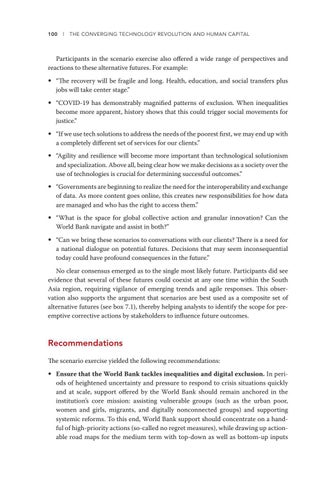100 l THE CONVERGING TECHNOLOGY REVOLUTION AND HUMAN CAPITAL
Participants in the scenario exercise also offered a wide range of perspectives and reactions to these alternative futures. For example: •• “The recovery will be fragile and long. Health, education, and social transfers plus jobs will take center stage.” •• “COVID-19 has demonstrably magnified patterns of exclusion. When inequalities become more apparent, history shows that this could trigger social movements for justice.” •• “If we use tech solutions to address the needs of the poorest first, we may end up with a completely different set of services for our clients.” •• “Agility and resilience will become more important than technological solutionism and specialization. Above all, being clear how we make decisions as a society over the use of technologies is crucial for determining successful outcomes.” •• “Governments are beginning to realize the need for the interoperability and exchange of data. As more content goes online, this creates new responsibilities for how data are managed and who has the right to access them.” •• “What is the space for global collective action and granular innovation? Can the World Bank navigate and assist in both?” •• “Can we bring these scenarios to conversations with our clients? There is a need for a national dialogue on potential futures. Decisions that may seem inconsequential today could have profound consequences in the future.” No clear consensus emerged as to the single most likely future. Participants did see evidence that several of these futures could coexist at any one time within the South Asia region, requiring vigilance of emerging trends and agile responses. This observation also supports the argument that scenarios are best used as a composite set of alternative futures (see box 7.1), thereby helping analysts to identify the scope for preemptive corrective actions by stakeholders to influence future outcomes.
Recommendations The scenario exercise yielded the following recommendations: •• Ensure that the World Bank tackles inequalities and digital exclusion. In periods of heightened uncertainty and pressure to respond to crisis situations quickly and at scale, support offered by the World Bank should remain anchored in the institution’s core mission: assisting vulnerable groups (such as the urban poor, women and girls, migrants, and digitally nonconnected groups) and supporting systemic reforms. To this end, World Bank support should concentrate on a handful of high-priority actions (so-called no regret measures), while drawing up actionable road maps for the medium term with top-down as well as bottom-up inputs

